What you need to know about the story of Fadak / Abu Bakr confesses to usurping the inheritance of Hazrat Zahra
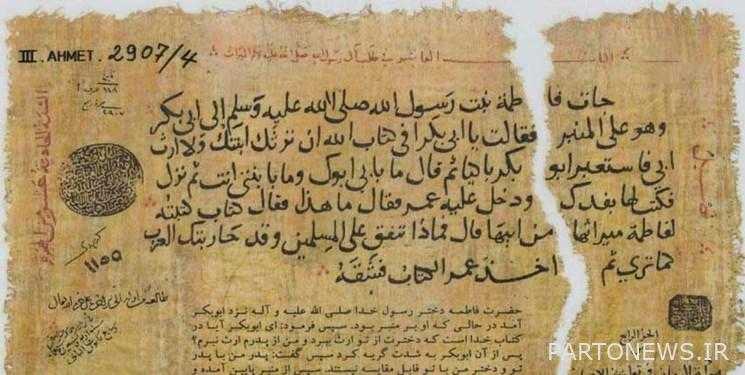
Life group; زینب نادعلی: Fadak was a settlement near 140 km from Medina, Fadak was a pure property and a land that was never conquered by war and conquest, but when the news of Khyberians reached the village of Fadak, everyone came to meet the Holy Prophet. And the family should enter through peace and give half of the lands of Fadak to the Prophet (PBUH) and allocate the other half to themselves, and in return they should be completely free to perform religious ceremonies and the Islamic government should maintain the security of their region.
It is said that when the verse “And At-Dhalqarbi al-Haqqa …” was revealed, the Holy Prophet gave Fadak to his dear daughter Fatima, peace be upon her. Less than ten days after the death of the Prophet, peace be upon him and his family, Zahra, peace be upon him, was informed that Abu Bakr’s agents had expelled her workers from the land of Fadak and had taken over the field of work. For this reason, Fatima, peace be upon her, went to Abu Bakr, who was the caliph at that time, with a group of women from Bani Hashim, in order to regain her right, and talks took place between the daughter of the Prophet and Abu Bakr. The daughter of the Prophet said to Abu Bakr: Why did you deprive me of your right and expel my workers? The caliph says: I have heard from your father that the prophets do not inherit anything from themselves. Fatemeh said: Fadak was given to me by my father while he was alive and I was the owner of Fadak during my father’s lifetime. The caliph said: Do you have any evidence for this? Fatima said: My witnesses are Ali, Umm Salma, and according to some, Imam Hassan and Imam Hussein (as). These people all testified, then Ali (as) said to Abu Bakr: Whenever I claim that money is in the hands of a Muslim, from whom do you seek evidence? Are you a witness to me as a plaintiff or to another person who owns or seizes the property? The caliph said: At this time I ask you for a certificate. Ali (pbuh) said: Fadak has been in our possession for a long time, now that Muslims say that Fadak is public property, they must testify.
In order to free Fadak from the control of Zahra Athar, the caliph resorted to a hadith which summarizes as follows: “The prophets do not inherit anything from themselves, and their inheritance is charity after their death.”
According to Shiite and Sunni narrations, Umar and Aisha testified to Abu Bakr at this time, and Abu Bakr accepted their martyrdom, but did not accept the martyrdom of Imam Ali because of his relationship with Hazrat Fatima, and the martyrdom of Umm Salma because she was a woman. The question arises whether Aisha was not a woman or did not have a relationship with Abu Bakr?
Moreover, when we present this hadith in the Qur’an, it becomes clear that it is not true and it is not intellectually correct that the prophets should not inherit for their children, as it is stated in Surah Maryam, verses 5 and 6: The prayer reminds me: I am afraid of my cousin after my death. My wife is infertile. May God grant me a child to inherit from me and the family of Jacob. “Lord, make him pleasing.”
And in Surah An-Naml, verse 16, God says: “Solomon inherited from David.” The caliph of the time, at the instigation of those around him, wanted the daughter of the Prophet and her husband Ali to be deprived of Fadak’s income so that they could not give alms to the poor and others, and as a result, those who gathered around them out of worldly greed would disperse.
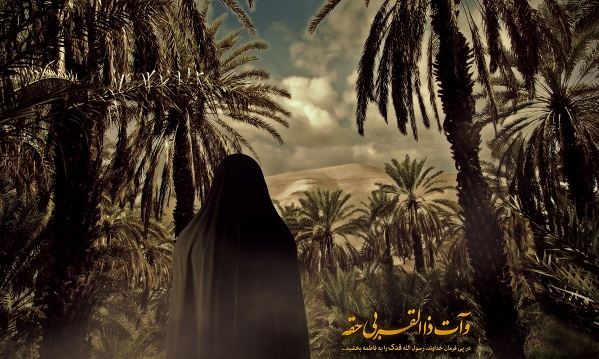
Another is that some people in the time of Abu Bakr refused to pay zakat and the revenues of the treasury of the treasury decreased. Fadak was a land with many groves, earning about 70,000 dinars a year; For this reason, Abu Bakr took Fadak from the daughter of the Prophet, and many other Umayyad and Abbasid caliphs followed him. For the first time, Omar ibn Abdul Aziz returned Fadak to the descendants of Zahra and Bani Hashem.
In sufficient principles, a narration has been narrated from Hazrat Musa ibn Ja’far (as) which is partly stated: Following the protests of Hazrat Zahra (as) and the testimony of Amir al-Mu’minin (as) and Umm Ayman, Abu Bakr issued an order to stop attacking Fadak. Fatima (as) took the letter and returned, was informed on the way of life and took the letter and tore it and threw it away.
Following Omar’s behavior, Fatemeh, peace be upon her, asked for her relatives and friends, and she came to the Prophet’s mosque with them and stood behind the curtain. When the emigrants and the Ansar wept bitterly when they heard Fatima’s painful and sighing sighs that the place of fatherhood and oppression of the Muslims was empty, Fatima waited a while for silence to prevail and then recited a sermon.
In the beginning, in praise and thanksgiving, God said: Praise be to the Lord, whose giver came out of the sleeve of creation and gave color to the creatures of the world who were in the desert of non-existence. Thank God for teaching us the servants the lesson of gratitude and make gratitude our duty. He is the Lord who was before everything and will be after everything.
Then he said: This is Fatima, the daughter of the Prophet, who testifies to the oneness of God and confesses that Muhammad, my father, is his servant and messenger. You, the group of Muhajireen and Ansar, made a pact with your Prophet to return his religion with your own hands and to turn the world of humanity around the axis of his religion.
Then he spoke about Islam and the Book of God and performing prayers and fasting, Hajj and Jihad, and then he said: O Muslim people! You have been commanded not to leave us and not to leave the children of your Prophet alone and to protect his family.
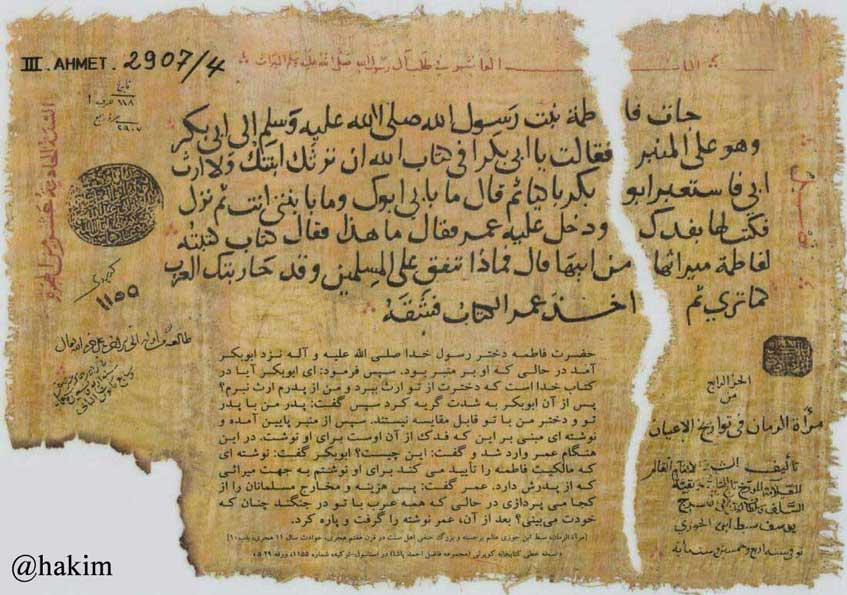
He introduced himself again and said: There is no help for lying to anyone standing in front of this holy grave. I do not exaggerate. This is my father who is sleeping in this tomb now. My father Muhammad (peace and blessings of Allaah be upon him) came and taught you morality and virtue in the school of virtue and ethics and taught you the religion of humanity. It is you who, until he handed over the life-giving cup, returned to the Old Testament and the period of ignorance, and proceeded to incompatibility, and to the rhythm of hypocrisy and separation … Has led astray.
Then he said words that came like a sledgehammer to the usurpers’ brains. He said: Who said that Fatima is deprived of her father’s inheritance ?! Who is the one who breaks the legal barrier of inheritance and interprets the Quranic verses in the air of his own soul? O Muhajir and Ansar, I am amazed by the words of this old man! Abu Bakr thinks that he can take the inheritance of Abu Qahafa, but Muhammad’s inheritance is forbidden to Fatima. No one has the right to quote a hadith from my father in front of the Quran.
Then Fatima recited verses from the Qur’an from Surah An-Naml, verse “And the heir of Solomon David …” in which the Qur’an speaks of the inheritance of Solomon and the inheritance of David. Then he recited the speech of Zakaria from Surah Al-Imran and from Surah An-Nisa ‘the order of inheritance from Muhajir and Ansar and said: O Muhajir and Ansar, what do you say with these clear verses ?! How do you want to shake a public law into an individual narrative ?! How do you want to deprive Fatima, the daughter of Muhammad, whose liver is raised and raised, of her father’s inheritance ?!
Then he turned to Abu Bakr and said angrily: I will take you by the hand on the Day of Resurrection and I will take back the violated right of you today.
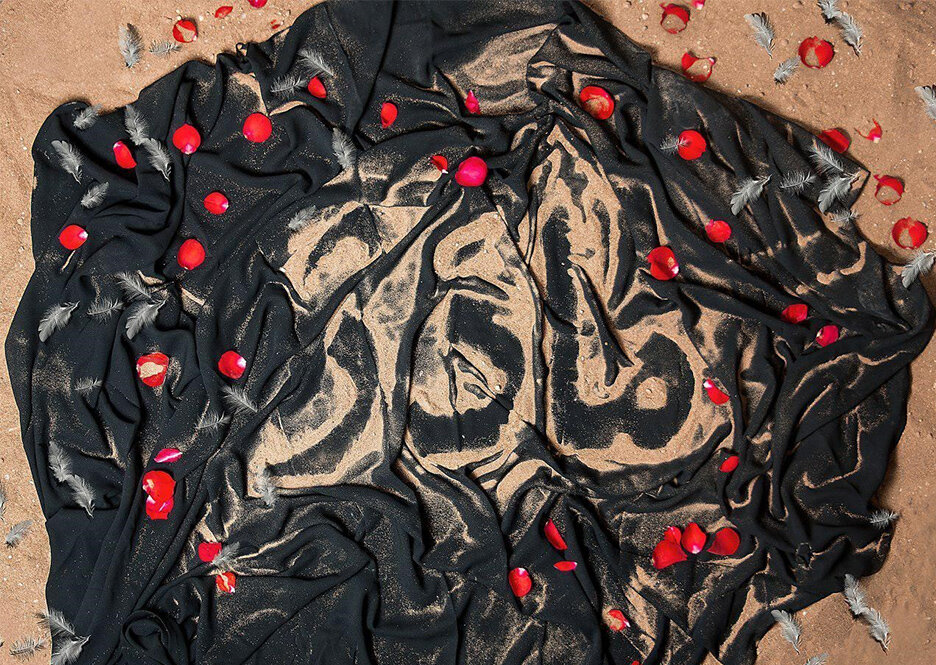
Then he turned to the youth of Medina and then to the tribes and the Ansar and said: O zealous youth! O devoted companions and helpers of Islam! What is this laxity and negligence that you have taken? O Ansar group, why are you depressed and silent like ice while a hypocritical and unworthy handful is stealing my right and my father’s relic from my floor ?! What is the matter with you that you have gold in the palm and force in the arm that you do not move? Where are those archers’ arms and where are those mountainous fists that you went to fight the infidels? How well did you get up and how badly did you sit down and shut up?
Abu Bakr had no choice but to surrender to the shocking words of Hazrat Zahra, peace be upon him, but the ill-wishers did not allow the right to reach the rightful and the caliphate and the province to be in their main position. Hazrat Zahra’s fiery words had such an effect that the fear of revolution and revolt of all the Taliban caused great fear in power.
Hazrat Zahra swore that she would not talk to Abu Bakr and Umar anymore. Then he turned his face from the people to the holy grave of his noble father and threw himself on the grave of his father in distress and said: My father, they oppressed me, they will soon be punished for their deeds on the Day of Resurrection. My father will weep for you as long as I live and my eyes will not stop shedding tears.
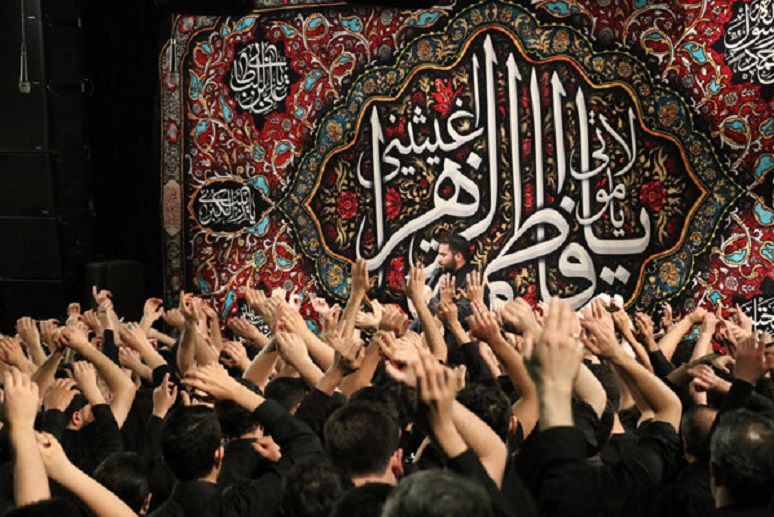
The women of Bani Hashem wept a lot and dragged the daughter of the Prophet from her father’s grave and took her home and fell down. Amir al-mu’minin Ali (as) also called on Fatima to be patient in this dark time when the clouds of sedition covered the sun of truth, and he himself waited 25 years for the young tree of Islam not to grow from its roots.
Historical sayings can be used that Abu Bakr himself also believed in the legitimacy of Hazrat Zahra (as) in the matter of Fadak. In this regard, several cases and witnesses can be mentioned:
According to the following page in the book “Imamate and Politics”:
When Abu Bakr and Umar to apologize! And they came to visit Fatima’s house, Abu Bakr confessed his mistake about Fadak and the caliphate and said:
“O beloved of the Messenger of God, you are angry in your inheritance and in your wife.”
“O beloved Prophet of God, we made you angry and upset about your inheritance from your father and about your husband (the caliphate).”
And then Fatima (as) said: “How can your family inherit from you and we do not inherit from Muhammad (peace be upon him) ?!”; “We are the inheritors of the people and not the inheritors of Muhammad.”
According to the famous historian Mas’udi: “Abu Bakr expressed regret and regret over several things at the time of his death; “Among other things, he said: ‘I wish I had not searched the house of Fatima (as).’
In narrative and historical texts, such cases can be found that show the legitimacy of the daughter of the Prophet (peace and blessings of Allaah be upon him) in her dispute and the oppression of the Ahl al-Bayt and the condemnation of the ruling regime in its action. And he is the best judge of God.
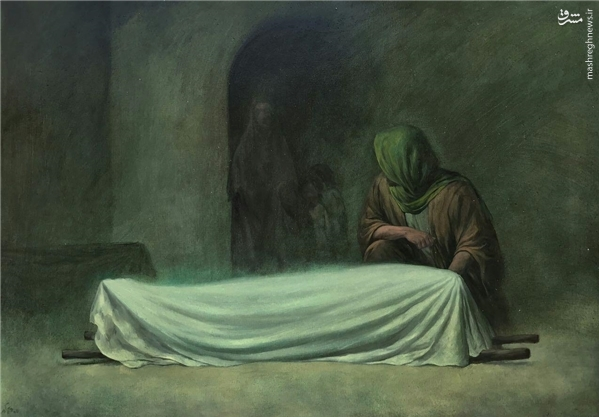
End of message /
.

